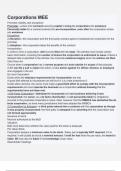-
1. Exam (elaborations) - States of matter 1.12 dalton-s law of partial pressures wiva k12 chemistry questions...
-
2. Exam (elaborations) - Social science law crr after exam 2 onwards questions and correct answers (elaboratio...
-
3. Exam (elaborations) - Gas law & imf test review questions and correct answers (elaborations) with 100% acc...
-
4. Exam (elaborations) - Tab permit questions and correct answers (elaborations) with 100% accurate , verifie...
-
5. Exam (elaborations) - How a bill becomes a law questions and correct answers (elaborations) with 100% accu...
-
6. Exam (elaborations) - Lreb 315 review questions and correct answers (elaborations) with 100% accurate , ve...
-
7. Other - Contract of indemnity and guarantee
-
8. Other - Contract of guarantee- definition, essentials and distinction from contract of indemn...
-
9. Exam (elaborations) - Law 231 midterm questions and correct answers (elaborations) with 100% accurate , ve...
-
10. Exam (elaborations) - Ch.3 criminal justice and the law questions and correct answers (elaborations) with ...
-
11. Exam (elaborations) - Test 3 ch. 31 questions and correct answers (elaborations) with 100% accurate , veri...
-
12. Exam (elaborations) - Oregon law worksheet questions and correct answers (elaborations) with 100% accurate...
-
13. Exam (elaborations) - Tdcj board questions and correct answers (elaborations) with 100% accurate , verifie...
-
14. Exam (elaborations) - Law of agency study guide for exam 1 questions and correct answers (elaborations) wi...
-
15. Exam (elaborations) - Mpt formats questions and correct answers (elaborations) with 100% accurate , verifi...
-
16. Exam (elaborations) - Crj chapter 6 questions and correct answers (elaborations) with 100% accurate , veri...
-
17. Exam (elaborations) - Test 3 questions and correct answers (elaborations) with 100% accurate , verified , ...
-
18. Other - Title warrants, express warranties, implied warranties games and activities
-
19. Exam (elaborations) - Bar exam - boys state - california questions and correct answers (elaborations) with...
-
20. Exam (elaborations) - Rmin ch 5 exam 2 questions and correct answers (elaborations) with 100% accurate , v...
-
21. Exam (elaborations) - Law test questions and correct answers (elaborations) with 100% accurate , verified ...
-
22. Exam (elaborations) - Blw 411 test 3 questions and correct answers (elaborations) with 100% accurate , ver...
-
23. Other - Agency partnerships corporations
-
24. Exam (elaborations) - Conflict of laws - mee questions and correct answers (elaborations) with 100% accura...
-
25. Exam (elaborations) - Copyright law final exams test 3 questions and correct answers (elaborations) wit...
-
26. Exam (elaborations) - Claw test 2 questions and correct answers (elaborations) with 100% accurate , verifi...
-
27. Exam (elaborations) - Exam law of agency - champions questions and correct answers (elaborations) with 10...
-
28. Exam (elaborations) - Vreb licensing overview questions and correct answers (elaborations) with 100% accur...
-
29. Exam (elaborations) - Re principles h- questions and correct answers (elaborations) with 100% accurate , v...
-
30. Exam (elaborations) - Btm questions and correct answers (elaborations) with 100% accurate , verified , lat...
-
31. Exam (elaborations) - Law of cosines quiz 100- questions and correct answers (elaborations) with 100% accu...
-
32. Exam (elaborations) - Employment law - age discrimination + religious discrimination in employment+ race, c...
-
33. Exam (elaborations) - Morality review for the ten commandments questions and correct answers (elaborations...
-
34. Exam (elaborations) - Legal exam iii review questions and correct answers (elaborations) with 100% accurat...
-
35. Exam (elaborations) - Chapter 40, chapter 38, chapter 37 final questions and correct answers (elaborations)...
-
36. Exam (elaborations) - Chapter 13 - bankruptcy law mindtap questions and correct answers (elaborations) wit...
-
37. Exam (elaborations) - Law 342 chapter 8 - gender discrimination employment law questions and correct answe...
-
38. Exam (elaborations) - Law 532 questions and correct answers (elaborations) with 100% accurate , verified ,...
-
39. Exam (elaborations) - Letter from birmingham jail quiz questions and correct answers (elaborations) with ...
-
40. Exam (elaborations) - Corporations mee questions and correct answers (elaborations) with 100% accurate , v...
-
Show more




